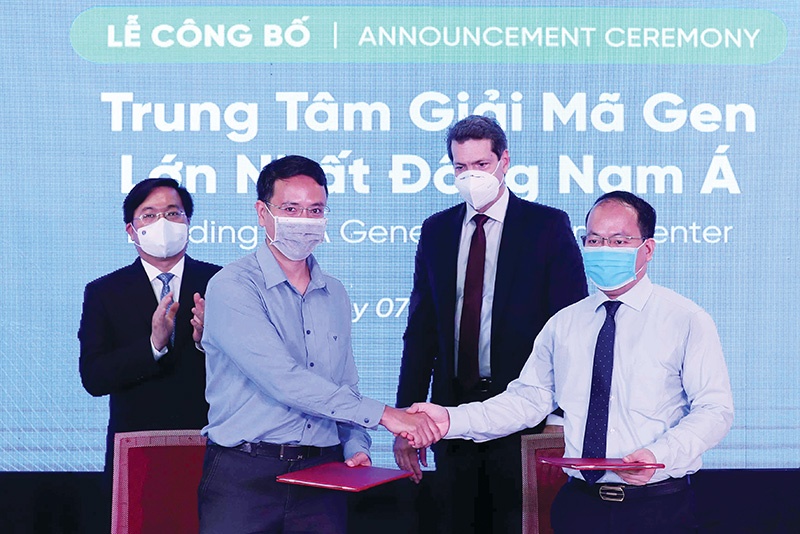FDI flow on right path
 |
| Genetica is cooperating with the National Innovation Centre to build a genetic decoding hub for Southeast Asia |
With the support of the Ministry of Planning and Investment (MPI), gene sequencing tech group Genetica is to cooperate with the Vietnam National Innovation Centre (NIC) to build a genetic decoding centre for Southeast Asia, located at the NIC in Hanoi.
The costs were not unveiled, but both sides expect the centre to be up and running before the end of 2021.
As announced at a ceremony last week, the Genetica centre at the NIC building will be designed along with the same standards as its US-based lab, with the most rigorous set of standards for genetic testing in the world. Accordingly, Vietnam will be one of very few Southeast Asian countries running CAP and CLIA-standard genetic testing laboratories in order to create new discoveries regarding genetic diseases, developing gene therapy regimens, and researching new medicines based on Asian and Vietnamese genomes. It will also focus on targeted healthcare, personalised medicine, and precision medicine.
Originating from San Francisco, Genetica’s plans in recent years have tilted towards Vietnam. In 2018, it looked set to expand to the Southeast Asian market via Singapore as its key destination. However, those plans changed totally after Vietnamese-born founder Cao Anh Tuan met with MPI Nguyen Chi Dung in the United States that year.
Tuan is one of an estimated 100 Vietnamese overseas scientists worldwide who were invited to return to Vietnam to participate in the launching ceremony of the Vietnam Innovation Network three years ago, to enable the country to keep pace with the Industry 4.0 era. The experience as well as the support of leaders touched Tuan and helped steer his plans towards Vietnam.
Davipharm – one of the leading domestic manufacturers of high-quality generic drugs and a member of Adamed Group – moved a step closer last week to realising its goals in Vietnam by announcing its certification of EU-GMP quality standards. The EU-GMP certification is the most important milestone in the company’s strategy of raising standards of drug production.
CEO Michal Wieczorek said, “With $50 million investment, of which over $10 million has been spent upgrading our plant in the southern province of Binh Duong and the improvement of quality processes, we have committed to contributing to the local economy not only by paying taxes and creating jobs, but also by providing high-quality medicines at affordable prices to local patients, thus supporting the Ministry of Health (MoH) to optimise the spending on drugs.”
He added that with further expansion of the business by developing exports and backing the improvement of Vietnam’s trade balance, Davipharm hopes to be emblematic of future foreign investment in Vietnam.
“Despite the pandemic challenges, we managed to pass the virtual EU-GMP audit. I believe that EU-GMP qualified factories are the key growth drivers in Vietnam, and the only way to develop the local company. With this certification, we are ready to achieve our other ambitious goals,” he added.
There are also some challenges posed by the government administration to pharma businesses. Namely, a significant number of marketing authorisations (MAs) is going through the renewal procedure as required by laws. However, besides the regulatory delays, there are some administrative requirements impossible to meet, especially during the pandemic period.
Wieczorek has appealed to the government to enable the extension of the MAs, and to the MoH to streamline and simplify the drug registration procedures. “If the government creates an attractive and welcoming investment environment for the pharmaceutical industry, I’m convinced that many more companies will follow in our footsteps. But we need incentives, not obstacles,” summarised Wieczorek.
Also last week, Japan’s Fujikin Inc. held a groundbreaking ceremony for a research and development (R&D) centre in Danang Hi-Tech Park. With an investment capital sum of $35 million, this is the first R&D centre developed by Fujikin in Vietnam.
The project’s purpose is to speed up scientific R&D in fields such as robotics, drones, nanotechnology, hydrogen energy equipment, water purification, wireless power transmission, and novel material development.
Following the inauguration, Fujikin plans to bring the R&D centre into operation and begin manufacturing in the second quarter of 2022, marking the company’s 20th year in the country. To provide enough high-quality staff for the project, the company has negotiated a human resources training agreement with the Danang College for Science and Technology.
Earlier in October, Nestlé Vietnam announced an extra $132 million investment in its Nestlé Tri An factory in the southern province of Dong Nai to increase its processing capacity of high-quality coffee lines. This investment has brought the total foreign investment value of Nestlé Vietnam to nearly $730 million.
According to the Ministry of Planning and Investment, Vietnam wooed $22.15 billion in the registered foreign direct investment in the first nine months of 2021, up 4.4 per cent on-year.
Source: https://vir.com.vn/



